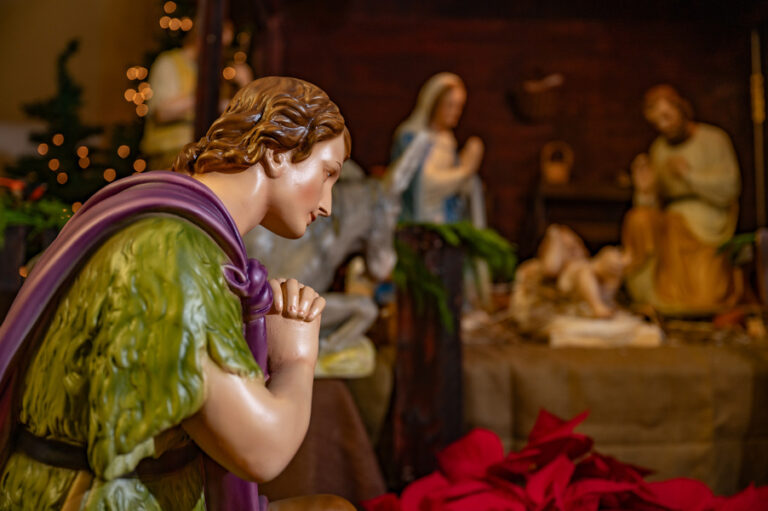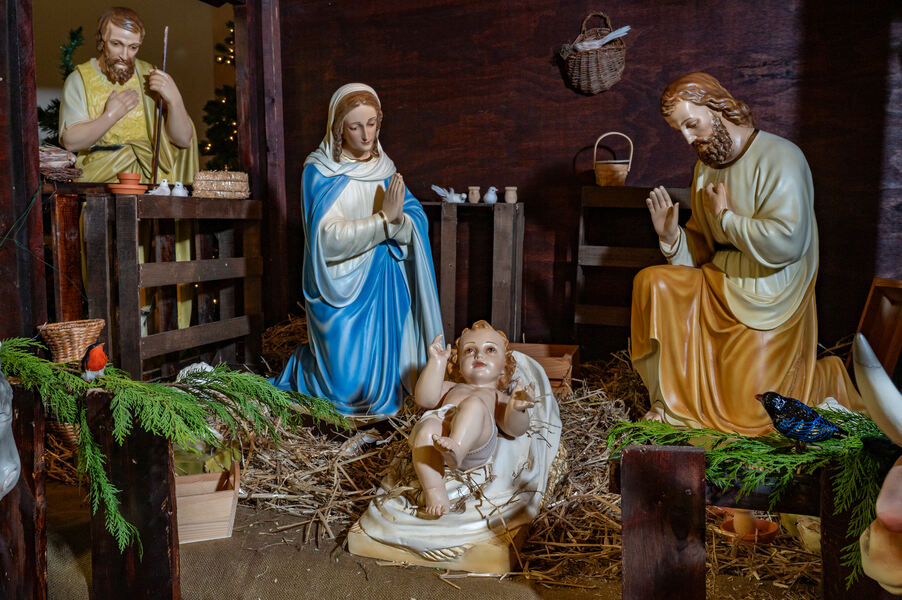
St. Casimir Church in Canton, Md., is one of the sites available where Catholics can pray before a Franciscan parish Nativity to receive a plenary indulgence during the Christmas season. (Kevin J. Parks/CR Staff)
Catholics will have the opportunity to obtain a plenary indulgence from Dec. 8, the solemnity of the Immaculate Conception of the Blessed Virgin Mary, to Feb. 2, 2024, the feast of the Presentation of Jesus Christ in the Temple.
The key to this spiritual privilege lies in prayer before a Nativity scene at a Franciscan church, a tradition inspired by St. Francis himself, who crafted the inaugural Nativity scene in Greccio, Italy, in 1223, symbolizing the profound mystery of the Incarnation.
During the feast of St. Francis of Assisi on Oct. 4, the faithful gathered at the Basilica of St. Francis in Assisi, Italy. The occasion honored the beloved Italian saint and the 800th anniversary of the approval of the Rule of St. Francis, alongside the inception of the Nativity scene in Greccio.
As part of the celebration of this Franciscan centenary, the Conference of the Franciscan Family sought the approval of Pope Francis for a plenary indulgence by “visiting the churches run by Franciscan families throughout the world and stopping in prayer in front of the Nativity scenes set up there.”
The Apostolic Penitentiary welcomed the request, and Pope Francis granted the faithful the opportunity to receive this indulgence under the usual conditions.
Expressing St. Francis’s deep affinity for the Incarnation, Franciscan Father Michael Heine, minister provincial of the Franciscan Friars Conventual of Our Lady of the Angels Province, noted that St. Francis aimed to convey to the people of a small Italian town that Jesus, in his humble birth, was poor — fully one of us. This portrayal, according to Father Heine, “offers comfort, knowing that we have a God who understands what we’re going through.”
Father Heine emphasized that even though they do not typically set up Nativity scenes that early in Advent, the indulgence applies to Franciscan-staff churches in Maryland, including St. Casimir in Canton and the Shrine of St. Anthony in Ellicott City. Father Heine highlighted that the St. Anthony Shrine building itself replicates the sacred convent where St. Francis is buried.
Both St. Casimir Catholic Church in Canton and St. Elizabeth of Hungary Catholic Church across from Patterson Park fall under the pastoral care of the Franciscan Order of Friars Minor Conventual Our Lady of the Angels Province.
Additionally, parishioners are invited to visit and pray before these Nativity scenes in the St. Stanislaus Kostka chapel on the corner of O’Donnell Street and South Kenwood Avenue from Dec. 8 through Dec. 24, from 30 minutes before the 8 a.m. daily Mass until 4 p.m. on Mondays-Thursdays and 2 p.m. on Fridays.
The Nativity scene at St. Casimir Catholic Church will be blessed at the Christmas Vigil Mass Dec. 24 and will be available for prayer 30 minutes before and after all Masses throughout the Christmas season. The Nativity scene at St. Elizabeth Catholic Church will be available for prayer 30 minutes before all Masses beginning Sunday, Dec. 17, while the Nativity scene at St. Anthony in Ellicott City will be available for prayer inside the chapel daily 9 a.m.-4 p.m.
At St. Ambrose in Park Heights, staffed by Capuchin Franciscans, the Nativity scene will be set up and available for prayer starting on Christmas.
Parishioners who intend to seek a plenary indulgence can find the location of a Franciscan-affiliated church near them on an interactive map on the Secular Franciscan website, further highlighting that “Those who are sick or unable to participate physically can equally benefit from the gift of the plenary indulgence, offering their sufferings to the Lord or carrying out practices of piety.”

St. Casimir Church in Canton is one of the sites available where Catholics can pray before a Franciscan parish Nativity to receive a plenary indulgence during the Christmas season. (Kevin J. Parks/CR Staff)
What is a plenary indulgence?
An indulgence is a remission of the temporal punishment due for sins committed. A plenary indulgence is the removal of all punishment due to sin. Indulgences can always be applied either to oneself or to the souls of the deceased, but they cannot be applied to other persons living on earth.
Conditions to receive a plenary indulgence in all cases:
- Detachment from all sins, even venial.
- A plenary indulgence must always be accompanied by sacramental confession, holy Communion and prayer for the pope’s intentions.
- Sacramental confession and receiving the Eucharist can occur up to about 20 days before or after the act performed to receive a plenary indulgence.
- It is appropriate that Communion and the prayer take place on the same day that the work is completed.
Published in The Catholic Review
